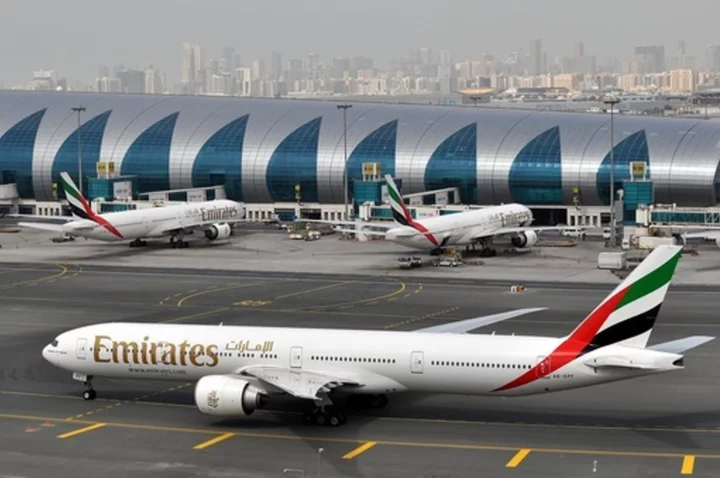DUBAI, United Arab Emirates (AP) — Long-haul carrier Emirates saw its most-profit year ever in 2022, earning $2.9 billion after bouncing back from the coronavirus pandemic shutting down global aviation, the airline announced Thursday.
The carrier's revival comes as Dubai, which owns the airline, has seen property prices skyrocket and people flood into the city-state in the United Arab Emirates as it lifted pandemic restrictions quickly and welcomed Russians fleeing Moscow's war on Ukraine.
Emirates' annual report put revenue for the carrier at $29 billion in 2022, up 81% from 2021's figures of $16 billion. That drastic swing comes after the airline reported a $1.1 billion loss in 2021.
The city-state, one of seven hereditarily ruled, autocratic sheikhdoms that make up the UAE, provided Emirates some $4 billion in a bailout in the depths of the pandemic. Even today as travel has bounced back, the carrier still has some of its double-decker Airbus A380s still parked, awaiting mechanics to be able to fly again.
“We had anticipated the strong return of travel, and as the last travel restrictions lifted and triggered a tide of demand, we were ready to expand our operations quickly and safely to serve our customers," Sheikh Ahmed bin Saeed Al Maktoum, the chairman and chief executive of Emirates, said in a statement.
The report said Emirates has repaid just over $2 billion in other loans taken from financial institutions during the pandemic, putting the total loan amount from outside of the government at $4.7 billion.
The overall Emirates Group, which includes travel company dnata, as well as food, beverage and leisure holdings, reported profits of nearly $3 billion off revenues of $32.6 billion.
The overall group declared a dividend to its owner, the sovereign wealth fund Investment Corporation of Dubai, of $1.2 billion.
Emirates acknowledged facing “a temporary setback” when it comes to receiving new airplane orders, particularly as manufacturers struggle to regroup and face supply issues following the height of the pandemic. The airline already has on order 115 Boeing 777Xs, 30 Boeing 787 Dreamliners and 50 Airbus A350-900s, with the first planes likely not being delivered until the middle of next year.
That delay has seen Emirates embark on a $2 billion retrofit program for 120 of its Airbus A380s and Boeing 777s.
Emirates also has struck deals with United Airlines and Air Canada to share routes, apparently putting to bed years of bad blood between U.S. carriers and the Dubai airline.
As of now, Emirates has a fleet of 260 Boeing 777s and Airbus A380s flying to 150 passenger and cargo destinations. The airline carried 43.6 million passengers and 1.8 million tons of cargo during 2022.
Earlier Thursday, Emirates announced it would create a $200 million fund for research and development projects aimed at reducing the use of fossil fuels in commercial aviation. The airline said the funding would be distributed over three years.
“It’s clear that with the current pathways available to airlines in terms of emissions reduction, our industry won’t be able to hit net zero targets in the prescribed timeline,” airline President Tim Clark said in a statement. “We believe our industry needs better solutions, and that’s why we’re looking to partner with leading organizations."
Emirates separately will aim to use so-called sustainable aviation fuel as well when possible — though it remains incredibly scarce in the market. In January, the airline successfully flew a Boeing 777 on a test flight with one of its two engines entirely powered by the fuel.
The announcement also comes ahead of Dubai hosting the COP28 climate talks in November.
___
Follow Jon Gambrell on Twitter at www.twitter.com/jongambrellAP.

